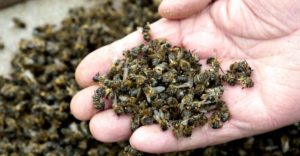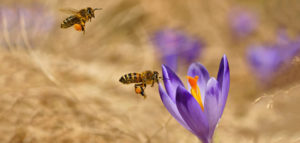Scientists say neonicotinoids (“neonics” for short), a highly toxic and widely used family of pesticides, is killing off bees and other pollinators — and threatening ecosystem health and food security.
By Courtney Lindwall
Around the world, bees and other pollinators are dying off in droves, with potential long-term impacts on ecosystem health and food security.
Scientists are now pointing to a highly toxic and widely used family of pesticides known as neonicotinoids (“neonics” for short) as a primary culprit.… Read the rest
Tag: bees
Bayer and Other Seed and Pesticide Companies Pressured Researchers to Omit Pictures and Results from Study
Bayer has been in the spotlight for trying to avoid compensating people who became sick from using its Roundup weed killer, it seems the company is likewise to be complicit for trying to conceal risks associated with its insecticides. It wasn’t alone.
From U.S. Right to Know:
Agrichemical giant Bayer helped fund a study by university academics, then pressured them to omit photos that implicated a defective insecticide-treated seed product as a threat to bees, according to communications obtained by U.S.… Read the rest
As If We Haven’t Done Enough Damage Already: Yet Another Way We Are Killing Honeybees With Neonicotinoids
Killing Honeybees With Neonicotinoids Part Deux: Yet Another Way We Are Destroying Bee Colonies
There are days when it seems like it just can’t get worse. Headlines scream about war, environmental poisoning, new record temperatures every day–where does it all end with the bad news?
Then there’s the honeybees. You’ve probably already heard about how Dorchester County in South Carolina in its zeal to combat a nebulous and possibly non-existent threat from mosquitoes carrying the Zika virus killed off an estimated 1.5 million honeybees with aerial pesticide spraying of naled, a dangerous neurotoxin.… Read the rest
Bayer Neonicotinoids Found To Be Dangerous To Bees By EPA
EPA Finally Comes Out Against Neonicotinoids: Bayer Chemical Under Fire For Risk To Bees
There is an old saying in the South of the United States: “Even a blind pig finds an acorn every now and then.”
It refers of course to the occasional good fortune that befalls even the most hapless and incompetent, and it’s a phrase that is applicable to the news out of the EPA today.… Read the rest




